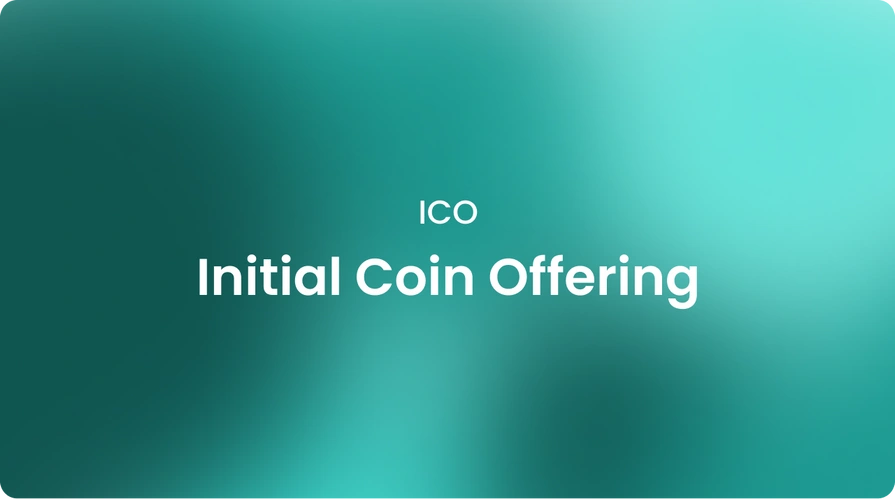|crypto, knowledgehub
What Is an Initial Public Offering (IPO)?

When a private company decides to "go public" and sell shares of its stock to public investors for the first time, it undergoes an initial public offering, or IPO. During an IPO, a company shifts from private ownership to having publicly traded stock that investors can buy and sell on a public stock exchange.
This IPO process allows the company to raise capital while giving everyday investors an opportunity to share in the potential growth of promising new businesses.
In this article, we'll take an in-depth look at what an IPO is, how the process works, potential pros and cons for companies and investors, and ways technology is modernizing this crucial step for startup success.
By the end, you'll have a solid understanding of what makes IPOs such an important milestone in the business world. Let’s start to explore the IPO fundraising model!
What does IPO mean?
Simply put, an initial public offering involves a private company selling its stock to the public for the first time. Prior to conducting an IPO, companies are considered private, with shares of ownership that are not publicly tradable.
After a private company conducts an IPO, investors can purchase and trade its stock on a public exchange. Companies list shares on major stock exchanges in the United States for IPO. To learn more about fundraising models, make sure to check out “initial coin offering”!
The history of IPOs
The concept of an IPO dates back centuries, despite changes in mechanics over time. One of the earliest recorded IPOs was the Dutch East India Company's initial public offering way back in 1602.
In the United States, IPO activity notably accelerated in the 1990s as regulations eased and internet technology revolutionized industries.
Some iconic tech IPOs from that era include Amazon (1997), Google (2004), and Facebook (2012). IPOs remain a pivotal step for both private companies and the investing public.
How does an IPO work?
There are several key steps for the IPO:
First, the company determines how much capital it needs to raise and hires investment banks to underwrite and advise on the offering. Companies then file prospectuses with regulators to disclose financials, risks, and the use of funds.
Next, the company embarks on a "roadshow," presenting to potential investors. The banks work to set the optimal stock price based on demand.
Shares began publicly trading on the IPO date, usually at a premium known as the "IPO pop." After listing, the newly-public firm remains accountable to shareholders under disclosure rules.
The initial public offering (IPO) process
- The company hires investment banks to underwrite and facilitate the IPO. Legal and accounting work begins.
- Companies make preliminary filings with the SEC, including an S-1 registration statement that details their business plans and financials.
- The banks work to build investor interest and determine an appropriate offering price for the shares. This event is known as a road show.
- The company sets an offering price per share. On the first day of public trading, the stock trades on the open market under the company's new ticker symbol.
- After paying minor transaction fees, the company receives cash proceeds from the IPO. Bank underwriters earn a sizable fee, typically 7% of the funds raised.
- The company, as a publicly traded firm, has obligations to its new shareholders, such as quarterly reports and disclosures.
Pros and cons of an IPO
For companies, going public through an initial public offering opens the door to raising substantial capital in a single transaction. However, public disclosure requirements and shareholder accountability add new layers of compliance.
Additionally, private investors get a chance to invest early, but IPO stock pricing involves risk. Understanding both the pros and cons helps determine whether an IPO makes sense for a given company's stage and goals.
What is the purpose of an initial public offering?
At its core, the purpose of an initial public offering is to allow a private company to transform into a publicly traded entity by issuing stock to outside investors.
This transition accomplishes a few key goals:
Raising capital
IPOs generate a substantial influx of funds that can fuel the company's growth plans. In 2021, the largest US IPO raised $10 billion.
Providing liquidity
Existing shareholders, like early investors and company founders, can convert portions of their ownership stake into cash by selling shares on the public market.
Increasing a company's public profile and credibility
Because of heightened disclosure rules, going public boosts a company's reputation as being more established in its industry.
Promoting future acquisitions
Other public companies can use publicly traded stock as acquisition currency in purchases.
The performance of initial public offerings
How does company stock typically perform after going public? Newly public stocks on IPO day often experience a phenomenon known as the "IPO pop," where opening share prices surge well above the predetermined initial offering price.
This IPO day price surge reflects heavy investor demand for allotments of scarce IPO shares. However, academic research shows medium- and long-term performance can vary widely.
On average, IPOs typically underperform the broader stock market in their first months and years of trading publicly. This is partly because the pre-IPO valuation process can fail to fully account for all risks. Other IPOs succeed spectacularly well because of their strong business models.
Of course, not every individual investor will be allotted IPO shares, leading to the question of whether IPOs make worthwhile investments once trading begins publicly. Let's explore some considerations around IPO access and timing!
Can anyone invest in an IPO?
Most public offerings prioritize institutional investors and individuals with brokerage accounts meeting specific thresholds for early share allotments, limiting direct participation in IPOs. These deep-pocketed allocators receive priority access to most public offerings.
However, once shares begin trading on the open market following the initial public offering, individual investors can participate on an equal playing field. In other words, you don't need special access or holdings to buy shares post-IPO.
You simply need a brokerage account and place trades as you would for any other publicly listed company. Investors also have the option to wait and see how the stock performs initially before investing. Proper due diligence on business fundamentals remains important.
Is an IPO a good investment?
As with any stock, there's no universal yes-or-no answer as to whether investing in a given IPO makes sense. As covered earlier, IPO performance ranges widely based on industry conditions and the underlying company specifics. Some best practices include:
- Before making a decision, thoroughly research the S-1 filing and management team background. Avoid bad eggs.
- Be mindful of the valuations assigned, avoiding those priced at irrational heights that deviate from growth forecasts.
- To avoid FOMO-based decisions, consider waiting for any first-day "pop" to cool before buying.
- Diversify across multiple IPO options rather than going all-in on one to mitigate company-specific risk.
How is an IPO priced?
Pricing shares accurately in an IPO is as much an art as a science, given the uncertainties in the process. Underwriters work with the issuing company to determine a level they believe will generate robust interest, while also leaving "meat on the bone" or an upside appeal to entice buyers.
Underwriters consider various factors:
- Comparable publicly traded companies in the same industry or market
- The IPO firm's financial projections and potential growth runway
- Market demand is determined by investor feedback from the pre-IPO roadshow
- The amount of capital sought to be raised in the offering
Companies intentionally price many initial public offerings on the conservative side to confirm interest before trading begins, rather than risking being left holding unallocated shares.
Still, valuation errors, both upward and downward, happen frequently. This signals why IPO due diligence matters greatly for discerning investors.
Investing in an IPO
Investing in an IPO can require special access constraints, as portions are reserved first. However, once shares began publicly trading, here are a few options individual investors typically have:
- Place a buy limit order once trading opens to take advantage of early volatility, which creates a better entry point than the IPO price.
- Use a brokerage that may periodically provide IPO allocations to certain eligible clients.
- Evaluate IPO investment funds and ETFs holding baskets of recent deals across various industries.
- Wait for the lockup period to end (usually 180 days) before employees or entities can sell, potentially impacting the price.
- Consider investing in an IPO if you are affiliated with the issuing firm in any way.
IPO alternatives
While IPOs attract much attention, alternatives exist, including private investment in public equity (PIPE) deals and special purpose acquisition companies (SPACs).
- PIPEs deposit capital directly into public companies without an initial offering, often at negotiated discounts.
- SPACs raise blind pools of capital in order to merge with and take private operating companies public, thereby circumventing standard IPO timelines and uncertainties. Both have been growing in popularity.
For example, by building on efficient digital platforms instead of physical branches, cryptocurrency companies like Cryptobunq can offer banking services at a fraction of the cost of traditional banks.
Cryptobunq is a one-stop-shop crypto service provider where you can benefit from expert blockchain services. From crypto exchange API to crypto checkout and invoicing, and from crypto batch payment to custody and wallet, CBQ offers reliable and secure services for you and your business.
You can trust Cryptobunq and its expert services for your wide range of crypto and blockchain needs. If you have hesitation, make sure to check out our case studies. You can also follow the CBQ blog to learn more about the key details of the growing crypto and blockchain ecosystem!
The bottom line
IPO allows private companies to access the public capital markets for the first time. The typical process includes filing with regulators, marketing to investors, setting the price, and beginning public trading. While IPOs enable capital raising and liquidity, they also bring new financial obligations.
Understanding company fundamentals, comparable valuations, and market demand are crucial for setting an appropriate offering price. Selectively participating in IPOs through various strategies can offer upside potential for investors with due diligence.
Cryptobunq is a crypto-friendly digital bank that provides a wide range of crypto and blockchain services. CBQ helps make crypto accessible to both institutions and individuals by providing security, governance, and compliance features, as well as crypto fundraising and crypto trading capabilities.
If you want to learn more about our services and grow your business with the help of blockchain technology without sacrificing security and expertise, contact us today. CBQ is here to help you adapt your business to the future. Get started with us!













